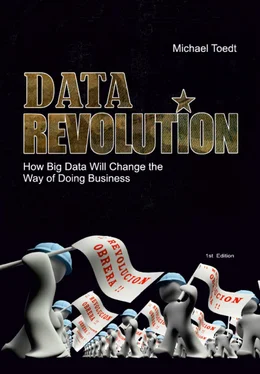DATA
REVOLUTION
How Big Data Will Change the Way of Doing Business
Michael Toedt (Editor.)
1 stEdition
Data Revolution
Michael Toedt
Copyright: © 2014 Michael Toedt
published by: epubli GmbH, Berlin
www.epubli.deISBN 978-3-7375-1689-1 Limit of Liability/Disclaimer of Warranty: This book is designed to provide information and motivation to our readers. The publisher does not intend to render any type of psychological, legal, or any other kind of professional advice. The content of each article is the sole expression and opinion of the author, and not necessarily that of the publisher. No warranties or guarantees are given by the publisher’s choice to include any of the content in this volume. Neither the publisher nor the individual author(s) shall be liable for any physical, psychological, emotional, financial, or commercial damages, including, but not limited to, special, incidental, consequential or other damages. Our views and rights are the same: You are responsible for your own choices, actions, and results.
Introduction Introduction Data is everywhere. There is no way to stop, deny or avoid it. Big Data is the next economic revolution. After the triumphant success of the Internet, the capabilities of managers to use the endless and steadily increasing amount of data will split companies into those who know what they do, and those who just guess. There will only be winners or losers. Managers need to understand that we are on the verge of a new economic era. The more they listen and learn, the higher the chance to win the data race. Why is Big Data so important? Big Data can help companies to increase their revenues, improve their profit margins, reduce risks and cut costs. Intelligent use of data supports customer acquisition, allows for higher prices, minimizes the risk of unprofitable investments, improves profit margins, supports the direct distribution channels, and helps to bypass expansive third-party vendors. It also generates customer loyalty and eventually helps to reduce technology, administration and payroll costs. There are manifold reasons to take a deeper look into Big Data.
Part A: Data Revolution – Michael Toedt Part A: Data Revolution – Michael Toedt
1. Just A Hype?
2. Big Data Stories
2. 1. The Google Flu Map
2. 2. Selling Without Owning
2. 3. Pregnant Without Knowing
2. 4. $750.000 for No Reason
3. Things You Should Know about Big Data
3. 1. The Definition of Big Data
3. 2. The ROI of Big Data
3. 3. Loyalty Programs – A Good Way to Collect Data
3. 4. Where Data Comes from – The Customer Journey
4. Big Data in the Hotel Industry
4. 1. The Reality of Hotel IT
4. 2. The Big Data Warehouse - The Heart of Big Data
5. Big Data – the Next Step in the Evolution of Marketing
5. 1. Data Security and Data Protection
5. 2. Big Data Marketing
5. 3. Communication: Content and Timing
5. 4. Communication Frequency and the Boomerang Effect
5. 4. 1. Response-Functions to Measure the Result of Marketing
5. 4. 2. How Consumers React To CRM Activities – Marketing Becomes Measureable
5. 5. The Value of Communication Channels
5. 6. The Change of Market-Research and Decision-Making
5. 7. The Social Media Pitfall
6. Changes in the Organizational Structure
7. Conclusion
Part B: Expert Views
7. Good or bad hotel customer from a sales perpective?
7. 1. Introduction
7. 2. Segmentation
7. 3. Codes
7. 4. USALI: structure of accounts
7. 5. Conclusion
8. Turn „Big Data“ Into Big Business
8. 1. Intro
8. 2. The Circle of Trust
8. 2. 1. Get Them Talking More: How to Increase Review Volume via Surveys
8. 2. 2. Making Sense of It All & Bringing Calm to the Chaos: Online Reputation Monitoring
8. 2. 3. Shout It From The Rooftops: Marketing A Hotel’s Success
8. 3. Big Brother Is Watching
8. 4. The “Hospitality Gene”
8. 4. 1. Hospitality Gene: The Beast
8. 4. 2. Hospitality Gene: The Blessing
8. 4. 3. Hospitality Gene: The Payoff
9. „Big Data“ What does Data Protection Law say?
9. 1. Introduction
9. 1. 1. A Brief Overview of Data Protection Law and „Big Data“
9. 1. 2. A Glance at the EU Provisions
9. 2. Which Law applies to Hotels in different Countries?
9. 3. The Prohibition Principle and the Separation of a Process into individual Steps
9. 4. Important
9. 5. What are the Solution Strategies?
9. 5. 1. Solution 1, Consent:
9. 5. 2. Solution 2: Waiving Personal Data
9. 6. Deleting Data & „Big Data“: an insoluble Problem?
9. 7. How does this relate to the Deletion Principle?
9. 8. What may happen in Case of Violations?
9. 9. But who is liable?
9. 10. Conclusion
10. Who cannot handle Data, successfully kills his business
10. 1. Survival of the Fittest
10. 2. Relevance matters
10. 3. Data know how as corporate asset
Index
About Michael Toedt
About Toedt, Dr. Selk & Coll.
Further Publications
Literature
Data is everywhere. There is no way to stop, deny or avoid it. Big Data is the next economic revolution. After the triumphant success of the Internet, the capabilities of managers to use the endless and steadily increasing amount of data will split companies into those who know what they do, and those who just guess. There will only be winners or losers. Managers need to understand that we are on the verge of a new economic era. The more they listen and learn, the higher the chance to win the data race.
Why is Big Data so important? Big Data can help companies to increase their revenues, improve their profit margins, reduce risks and cut costs. Intelligent use of data supports customer acquisition, allows for higher prices, minimizes the risk of unprofitable investments, improves profit margins, supports the direct distribution channels, and helps to bypass expansive third-party vendors. It also generates customer loyalty and eventually helps to reduce technology, administration and payroll costs. There are manifold reasons to take a deeper look into Big Data.
 Customer Data is the Salt of Our Modern Times
Customer Data is the Salt of Our Modern Times
In medieval times, merchants in the Mediterranean accumulated extreme wealth by trading in spices such as salt. In the very near future, the prosperity of a company strongly correlates with its ability to manage and use customer data. Data can be used to enhance existing and to create new products and services (co-creation), to market the right services at the right time through the right channels, and to provide a personalized service at the different points of interaction and sale.
Huge volumes of data are generated through the increasing use of social media and smart phones, as well as the continuous digitalization. The growth is exponential. This phenomenon is referred to as Big Data.
Experts agree that the Big Data phenomenon will have a significant impact on the structure of organizations and the way companies will work and interact with their customers. Many managers and organizations are still not aware of this fact, or fail to implement the changes, which are necessary to leverage Big Data. The lack of competence and knowledge and the lack of sufficient IT skills within the senior management prevent most companies from generating value from the available assets. The data is usually collected in data silos, which sit in the different departments and are not connected at all. The reason lies in the past decade, IT decisions were mainly driven by operations and were not based on an overall consumer oriented strategy.
Читать дальше

 Customer Data is the Salt of Our Modern Times
Customer Data is the Salt of Our Modern Times










